
ChatGPT’s presence is becoming increasingly ubiquitous, and academia is no exception. Learn how academics can effectively harness ChatGPT to their advantage, by streamlining email communication, enhancing clarity in academic writing, as well as using it to improve their research papers, to summarize lengthy texts and disseminate their work.
Contents
Using ChatGPT as an academic
The development of ChatGPT has had a transformative impact on the utilization and advancement of AI tools across various domains of life. Even individuals who were previously unfamiliar with AI or technology have become acquainted with the concept since the introduction of ChatGPT to the market.
ChatGPT has already made a significant impact on the academic landscape, and its influence is expected to bring about far-reaching changes in the years to come.
Numerous discussions have revolved around the potential challenges associated with AI in academia, including ethical considerations, as well as privacy and confidentiality concerns when using artificial intelligence in research.
However, there is now a discernible shift taking place, wherein scholars, researchers and students are embracing AI as a means to enhance their work, efficiency, and overall quality. And indeed, there is an proper ethical way to use AI in academic research.
Realizing the benefits of AI tools requires a thoughtful and critical approach to their usage and implications. When applied ethically, academics at all career stages can greatly benefit from their potential.
1. Streamline email communication as an academic with ChatGPT
Emails can often be a source of frustration for many academics. The constant influx of student inquiries, scheduling meetings, and sending out rejection notifications can be overwhelming. In these instances, maintaining the appropriate tone and adhering to academic standards in email communication is crucial.
Fortunately, with ChatGPT, simplifying this process has become much easier. You can simply jot down a draft email and let ChatGPT take care of the rest.
To illustrate its usefulness, let’s consider the following prompt provided to ChatGPT4:

Within seconds, ChatGPT generates a draft email:
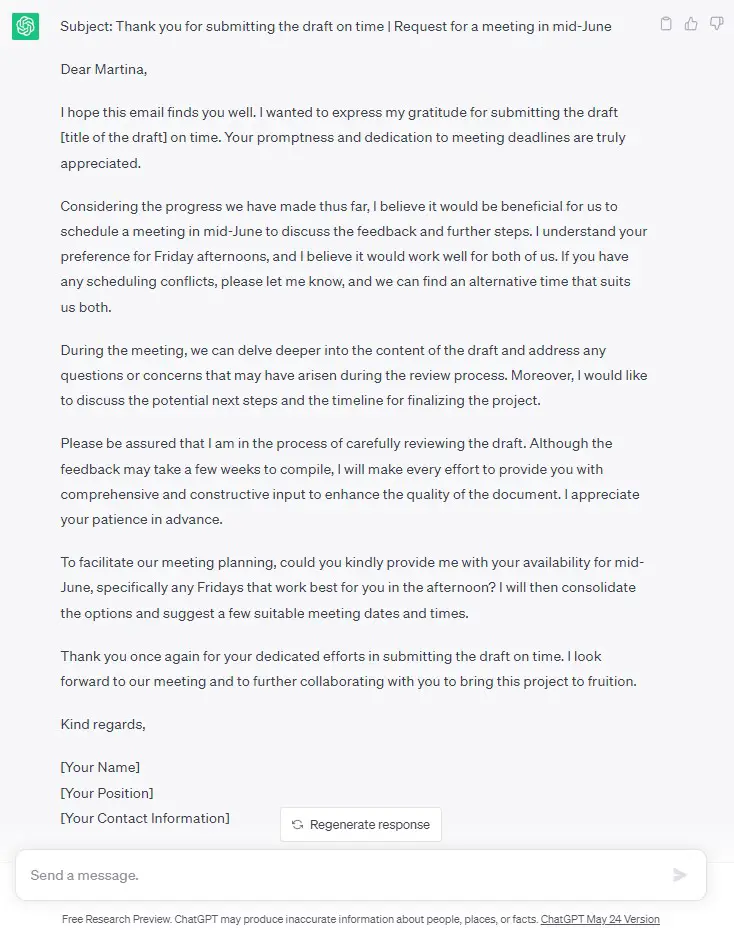
Instead of investing several minutes in crafting such an email yourself, you now have a good draft at your disposal. All you need to do is to check to ensure that the included information is correct, and potentially adjust it here and there to fit your own style.
You can even instruct ChatGPT to tailor the tone of the email to your preference, whether that means making it more formal or more casual. The possibilities are truly limitless.
Additionally, you can have peace of mind knowing that your email will be free of any spelling or grammatical errors.
2. Enhance clarity in academic writing with ChatGPT
Using ChatGPT to edit academic texts can significantly reduce the time spent on the editing process. It’s important to note that this approach differs from requesting ChatGPT to generate text from scratch, as doing so raises ethical concerns.
However, employing ChatGPT to refine your writing by simplifying complex concepts, summarizing content, highlighting key points, and ensuring grammatical and syntactical accuracy is entirely legitimate.
While it is advisable to run the final version through an AI content detector to ensure it is not flagged as AI-generated, the act of enhancing clarity in academic writing typically does not trigger these detectors. After all, the intellectual content remains yours; you are merely substituting a human editor with an AI-generated one.
Consider, for instance, the following example of a fictional conference paper abstract:

Clearly, there are some mistakes, and it is just a collection of ideas jotted down. A ‘brain dump’. Let’s see what ChatGPT does with this.
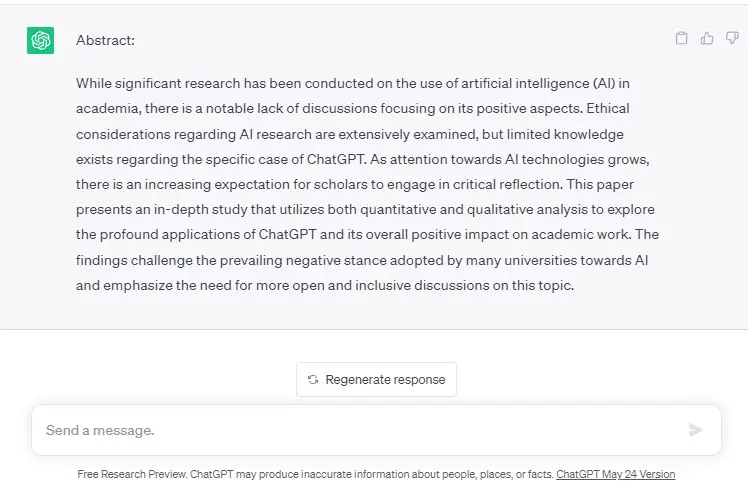
The result is a decent abstract that expresses the author’s idea much more clearly. To ensure its authenticity, we used the Crossplag AI detector, and the result is a mere 1% AI content index!
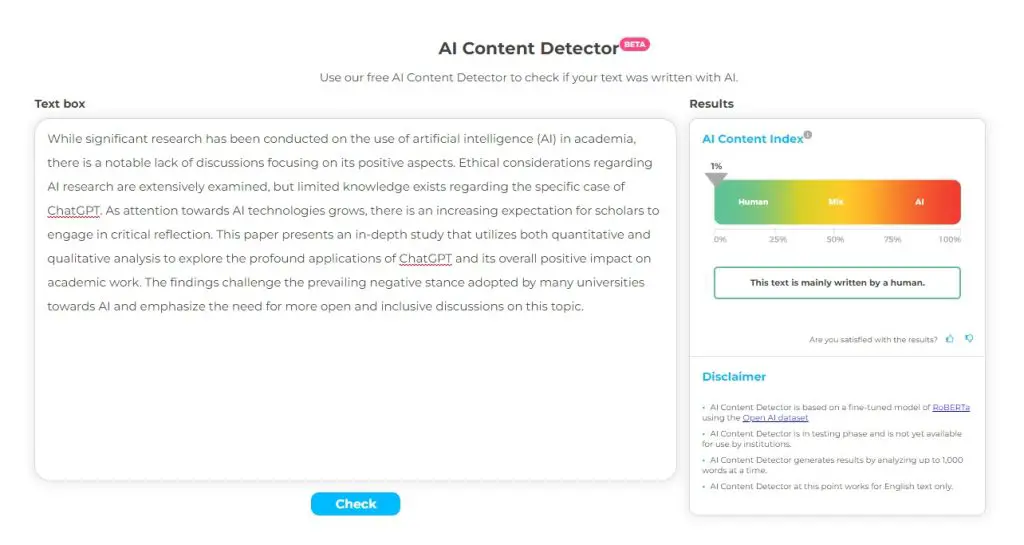
This serves as proof that it will not be flagged by AI content detectors.
3. Use ChatGPT to review your own research papers
Did you know that you can use ChatGPT to play devil’s advocate, as part of writing convincing research papers and already addressing potential criticism head-on?
This is possible. Just copy-paste your research paper passage into ChatGPT and tell it to act as a peer reviewer, pointing out criticism. It will give you valuable feedback and tell you what you may have forgotten but what needs to be improved.
By using ChatGPT as fictional peer reviewer before submitting your research to a scientific journal for the real peer review can considerably increase your chance of getting your paper accepted!
Let’s take a look at an example by asking ChatGPT to act as a reviewer for a text passage on desk rejections in academia.

And this is the result, which is clearly impressive and could have been generated by a human peer reviewer. It not only criticizes but also provides constructive comments and suggestions for improvement.
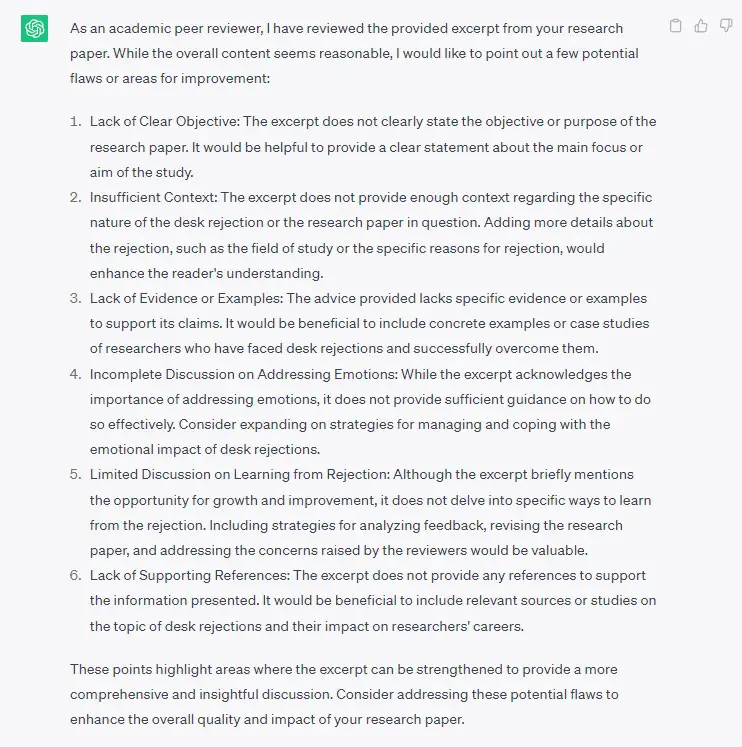
Thus, the lesson learned from this is that ChatGPT can considerably improve your research by making you critically reflect on your own writing and argumentation. Especially for those who do not have good supervisors or colleagues to review their work, they can greatly benefit from using AI technology. Not just for writing, but also for fostering critical thinking.
Please note that using ChatGPT as a reviewer for someone else’s paper is not ethical. Without the consent of the author/s, you should not copy and paste the original text into ChatGPT. Fortunately, Master Academia provides ample assistance on how to conduct proper peer reviews, including many sample reviewer comments. Thus, you do not need the support of AI to be a great peer reviewer!
4. Summarize lengthy academic texts with ChatGPT
In academia, efficiency is crucial. Time is often limited, and advancements in technology have increased the amount of reading that academics are expected to do, particularly when conducting literature reviews for academic publications.
Fortunately, ChatGPT can be of assistance by summarizing lengthy texts and highlighting key points. By relying on these AI-generated summaries and highlights, academics can determine which parts of the text require more in-depth reading.
This approach saves valuable time that would otherwise be spent searching through various texts for hours, and prevents getting lost in the never-ending rabbit hole of academic publications.
The process is simple: just copy and paste a relevant passage, such as the theoretical framework of a paper, into ChatGPT, and request the system to provide a summary along with three main key points in bullet form.
Let’s take into consideration the example of the open access article titled “Preferential Trade Agreements, Geopolitics, and the Fragmentation of World Trade” authored by Dadush and Prost, published in the journal World Trade Review.

Although there is a slight delay of a few seconds in generating a response, the quality of the answer provided by ChatGPT is commendable:
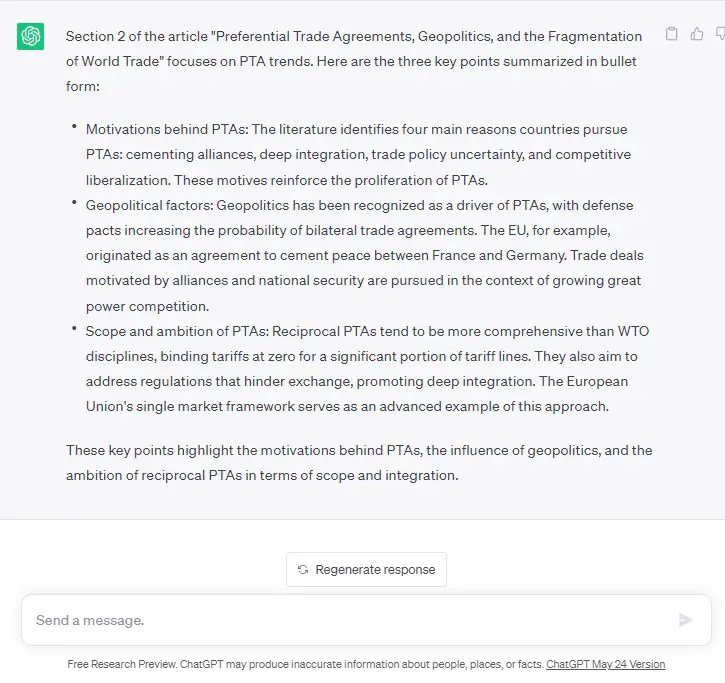
Thus, understanding texts on the basis of summaries with ChatGPTs and highlighted key points allows academics to grasp larger amounts of resources in smaller amounts of time, successfully speeding up an essential part of academic research.
5. Disseminate academic research with ChatGPT
Research dissemination and science communication are increasingly vital for academics, as the notion of scholars confined to ivory towers becomes outdated. Connecting with a wider audience and society through simple and accessible communication of research results is now emphasized, and often even considered as a criterion for promotion.
However, disseminating research and effectively communicating it in a simplified manner can be challenging for academics accustomed to using complex theoretical language and intricate sentence structures. Thankfully, ChatGPT provides a solution to this predicament.
By leveraging ChatGPT, academics can elevate their research dissemination and science communication efforts to new heights.
They can prompt ChatGPT to simplify their messages or present their findings in an easily understandable manner.
Moreover, academics can simply copy and paste their latest publication into ChatGPT and instruct it to generate tweets or other social media messages to promote the content.
Let’s continue with the example of the publication we discussed earlier. In this example, we told ChatGPT to create five tweets to promote the research article:

The result is exceptional – instantly usable and generated within seconds. Not only does it provide valuable content, but it also includes relevant hashtags to enhance visibility and reach.
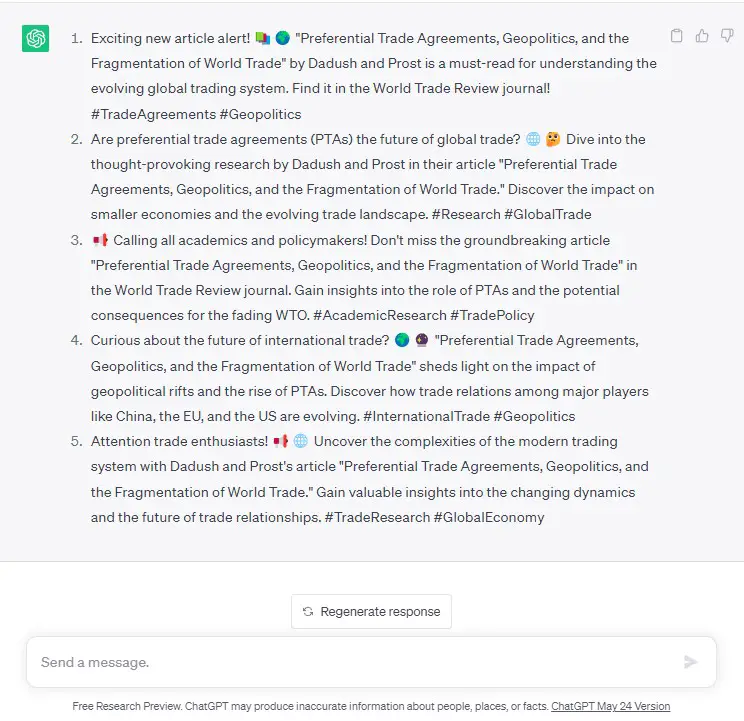
Closing thoughts
The development of ChatGPT has revolutionized the academic landscape by offering valuable solutions to various challenges faced by scholars. It can streamline email communication, enhances clarity in academic writing, aids in improving your research papers, and facilitates the summarization of lengthy texts.
Moreover, ChatGPT serves as a powerful tool for research dissemination, enabling academics to effectively communicate their findings to a wider audience through social media platforms.
With its capabilities, ChatGPT empowers academics to overcome obstacles, save time, and elevate the quality of their work. Embracing AI technology like ChatGPT opens up new possibilities for researchers and fosters a more accessible and impactful academic community, provided it is used smartly, responsibly, and ethically.



